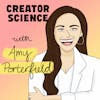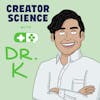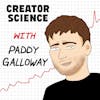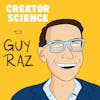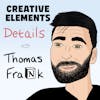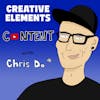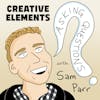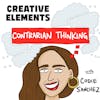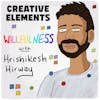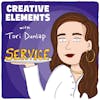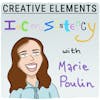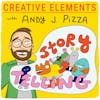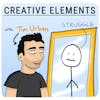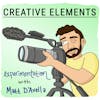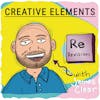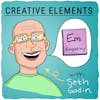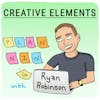
#26: Ryan Robinson – How to write blog posts that rank on page one of search results
Play EpisodeRyan Robinson is a full-time blogger, podcaster and content marketing consultant.
Ryan Robinson is a full-time blogger, podcaster and content marketing consultant. His blog teaches people how to start a blog and grow a profitable side business. Ryan's site attracts more than 500,000 visitors per month and earns more than $450,000 in affiliate income per year. In this episode we talk about starting his blog, his process for creating headlines and outlines, ranking for search, and how great Planning allows him to consistently publish and compete for search traffic.
Enroll in Ryan's Built to Blog course
Transcript and show notes can be found here.
***
LISTENER SUPPORT
Join our community on Facebook
Support this show through Buy Me A Coffee.
***
SPONSORS
Try Podia and save 15% for life as a Creative Elements listener
Start your free trial of SavvyCal and get your first month free using promo code ELEMENTS
ABOUT JAY CLOUSE
Subscribe to my weekly newsletter
Enroll in my course on podcasting, Podcast Like The Pros
***
PODGLOMERATE NETWORK
This show is a part of the Podglomerate network, a company that produces, distributes, and monetizes podcasts. We encourage you to visit the website and sign up for our newsletter for more information about our shows, launches, and events. For more information on how The Podglomerate treats data, please see our Privacy Policy.
Since you're listening to Creative Elements, we'd like to suggest you also try other Podglomerate shows surrounding entrepreneurship, business, and careers like Rocketship.fm and Freelance to Founder.
Learn more about your ad choices. Visit megaphone.fm/adchoices
Ryan Robinson 0:00
You shouldn't avoid pursuing a topic you really want to personally write about or really, really want to rank for, for the importance of your business. Even if the keyword difficulty suggests you'll never get there.
Jay Clouse 0:14
Welcome to Creative Elements, a show where we talk to your favorite creators and learn what it takes to make a living from your art and creativity. I'm your host, Jay Clouse. Let's start the show.
Jay Clouse 0:40
Hello, welcome to another episode of Creative Elements. Today's episode almost feels kind of like a full circle moment for me. Back in August of 2019. When I was really just beginning to plan this show, I was listening to one of my favorite podcast, Tropical MBA by Dan Andrews and Ian Schoen. The episode that I'm speaking of in particular was Episode 507, titled "50,000 Dollars a Month from one Blog Post?!" And Dan was interviewing a blogger named Ryan Robinson.
Dan Andrews 1:12
Like when was the moment that the penny dropped, and you're like, man, I could be a blogger who makes money online.
Ryan Robinson 1:20
There's been many moments where I thought that was going to be me. And it never took off quickly. I was at least three to four years into my blogging journey before it was making real money.
Dan Andrews 1:34
And by real, what would you say,
Ryan Robinson 1:37
I would call real money above 10,000 a month, something that I would look at as like a replacement of my day job, making somewhere in the six figure range, at least,
Jay Clouse 1:47
Between the title of the episode and that clip, I was really, really locked in to what Ryan was talking about. And as you probably know, by now, I love to write. So back in August of 2019 $10,000 per month by writing just sounded like a dream. But the interview got even better. Ryan publishes a monthly income report. And he has for years, and Dan noticed a big change in Ryan's reported monthly earnings.
Dan Andrews 2:14
Seems like something really important happen between January and February of this year. Before that, it was like, you know, I'm making 10,000 bucks and making 10,000 bucks and making 8000 bucks and then all of a sudden was like, make up 40,000 bucks. It's like, what is the story? Yeah, what happened between January and February 2019.
Ryan Robinson 2:33
One specific thing happened and that's my affiliate commissions from Bluehost started hitting my bank account.
Jay Clouse 2:42
Bluehost is a website hosting service. It's kind of crazy, but 37% of all websites are run on WordPress. And hosting is an essential part of getting a WordPress site online. Now to bring this back to Ryan. Ryan is a full time blogger podcaster and content marketing consultant has worked with fortune 500 brands and top startups like LinkedIn, Google, Adobe, Intuit, Creative Live, Zendesk, Oracle, and many more. He's written for or been featured in Forbes, Fast Company, Entrepreneur, Inc, and Business Insider just to name a few. And his blog at ryrob.com focuses mainly on helping other people start a profitable blog themselves. That one post that was referred to in the title of that Tropical MBA podcast is titled "How to Start a Blog in 2020 and make money easy guide to start blogging today." Now, this is not your ordinary blog post. This post is more than 23,000 words. And for comparison, one page of single spaced size 12 font text is about 500 words. So that's 46 pages of written text for this one article. And it goes in depth with just about everything you would possibly need to know about how to start a blog, including how to set up web hosting, and Ryan's recommendation Bluehost pays him a commission for every new customer. He refers through this post. That article and many others like it, rank on page one of search results for some very high volume search queries. Together, they drove more than 500,000 page views to Ryan's website in August of 2020. In those visits resulted in more than $43,000 in affiliate revenue, about $36,000 of which was from the hosting services Bluehost and Dreamhost. It is not hyperbole that when I heard that interview, I decided that SEO was going to become a priority for me. So it's really exciting to have Ryan here on this show. In this episode, we talked about starting his blog, his process for creating headlines and outlines ranking for search and how great planning allows him to consistently publish and compete for search traffic. Ryan also has a course called built to blog that I've taken personally and I highly recommend between that course and some really candid feedback that Ryan gave me about a year ago, I now have several articles ranking on page one for Freelancing School. In this episode, we go really deep. But if you want to go even deeper, Ryan graciously gave me an affiliate link for his course, which is in the show notes. That means that you can learn all of Ryan's secrets, and also support this show in the process. Let me know on Twitter or Instagram @JayClouse, what you think of this episode, and I'll be sharing more about Ryan's work in the Creative Elements listener group on Facebook this week. But now let's get into it. Let's hear from Ryan.
Ryan Robinson 5:38
My blog technically started while I was in college, it was a at the time very funny class title 2010 or 2011. It was called internet marketing. And it was this kind of, you know, relatively nebulous thing still, at the time, at least compared to where we're at today in 2020. But the very first thing we did in that class is we sat down, our teacher said, All right, everyone, open up your laptops, go to I don't know, if it's GoDaddy or Dreamhost, whatever was big at the time, and register your name.com. And so obviously, generic white man named Ryan Robinson, was already taken back in 2010. So I registered my nickname, ryrob.com. And that's kind of just where everything really began, the blog set, you know, largely dormant, aside from some class project stuff, and some random musings on, I think, is a Tumblr blog for a while for several years. And so 2014 is really kind of when my blog technically started as something you'd recognize it as today. Again, though, very early days, it kind of just began as me answering questions that a lot of my friends had related to starting businesses, navigating being a young professional, we're all kind of 22 trying to figure out our way through working in the professional world. And yeah, that's, that's really kind of where my blog started. And you can sort of look at the progression it's had throughout the years as a relation to who I am personally, in what I've been going through lots of writings about content marketing, as I became a content marketer, and, you know, musings on freelancing, as I, you know, became more and more of a prolific freelancer and writer through different types of publications. So, my blogs always been a place to document basically, lessons learn, answer questions that I, you know, have the gall to think I'm qualified enough to try and answer but again, you know, sharing that humility that I'm not perfect, I'm not the sole answer to everything there is in life. So trying to just do that with some humility too.
Jay Clouse 7:41
I feel like I got started writing similar timeframe. And I see a lot of people, you know, they'll buy the domain, they get excited. They put up the blog, whether it's Squarespace or WordPress site, or whatever it is, and they start writing, you know, kind of stream of consciousness. Here's what's top of mind for me right now. At what point did you start thinking more technically about your writing, especially as it relates to search?
Ryan Robinson 8:05
I think the real transition happened for me once I took my very first job in content marketing. So when I graduated from college, this was 2012. I took a job where I kind of did everything marketing and sales for this little tiny tech startup. And part of my responsibilities were, Hey, Ryan, like, you know, we've heard a lot about this blogging stuff. Can you figure out if it's worth you spending some time on and so basically, I began tinkering with a company blog for a little tech startup. And we started to like, get some traffic from search engines a little bit from social as well. So that's kind of when I began to see like the inklings of there's, you know, maybe there's something here. And I really didn't turn it into something really, like, well thought out and strategized, and a business for myself for at least a few more years. But I began sort of thinking in terms of like, search queries, right. So I began writing blog posts on my own site that kind of sat at the intersection of what I wanted to talk about what I'm personally interested in. And then also what kind of needs Can I meet from a search perspective? What are people asking out there as related to what I know I want to talk about personally, and that's kind of that convergence is where I've always tried to keep my sweet spot.
Jay Clouse 9:22
It feels like when somebody enters in a space, and there's a lot of people listening to the show, who they've listened to a couple of my other interviews, or they've they've started to probably get the inkling like I have, okay, we need to start caring about search, we need to be writing for what people are actually searching for. And for me, it took months for even making that realization and admitting that to myself to actually doing the work to learning like Okay, so what does that process look like? So can you walk us through in the most approachable way possible? So hopefully someone takes this and starts doing it. What is the shortlist of like steps to say I'm going to write something that I know people are actually looking for.
Ryan Robinson 10:02
I always start with my needs first. I think that's, that's a really important part, at least about my process, I know that some people are able to, you know, build substantial blog audiences online by writing about topics that they're not personally interested in. But for me, that doesn't work at all, I have to be answering my own questions or talking about my own experiences. So I think the kind of the mantra of making sure that your own, you're within your own target market is really, really important to me, because I am a blogger, I am a content marketer, I am a freelancer, I know these challenges, I've experienced them personally. And so I, I have kind of a baseline understanding of what I should be writing about what other people want to also learn about in this space. But you know, just generally speaking from like a very basic standpoint, I think back to my very early days of blogging, I looked at what other successful bloggers in my space were already writing about. So you can always gather inspiration, I don't think it's necessarily, you know, a guarantee that just because someone else wrote about it, it's a need, but it can give you an inkling. So start by looking at some of your you know, quote unquote, competitors, or people that you kind of resonate with that you'd like to emulate some of their results, start by looking about what they already talked about. Don't just trust that as kind of the end all be all though, go and do some keyword research. And I'm a huge fan of, you know, the paid tools out there sem rush h refs to do keyword research, because I think they're, they're really, really reliable and dependable to kind of confirm that, yes, other people are also searching for this out there. If you just Google Search free keyword research tools, there's also a ton of those that are pretty good, too. And it'll I think, at this stage, the important thing is to just get directional advice, kind of a yes, this could be a good topic to write about, or no, this is probably not worth it, because there's only 20 people a month searching for this. So that's kind of where I would recommend starting is, you know, what do other people write about that clearly have some success and double check that that's that looks good.
Jay Clouse 12:10
Just jumping in here to say, I love that advice. Because one of the things a lot of people will ask me is, they want to figure out like, they know they want to do something on their own. But they're they feel so stuck at that step. They're kind of like, but what do I care about enough that I want to invest time into. And one of the pieces of advice that I've come to start recommending to people as well think about who you've naturally been attracted to on Instagram or Twitter, like who you falling along with, because that's kind of like this shadow artist, indulgence that you're giving yourself, it means that you're interested in that topic area. So pairing that with, okay, now see what those people are creating and talking about, is a really, really great starting point. And if someone's beyond that starting point, if they've already started something they should at least know then, you know, topically, what is interesting to them. So it's looking at, again, people already playing in that space to see, well, what are they talking about? I think that's a great step.
Ryan Robinson 13:02
Yeah, no, I think that you, if you look at how you spend your time, that's always what I come back to as a way to find inspiration. Like I, I find that I spend tons of my weekends going on hikes. And so there was at one point in time, a few years ago, where I started working on a hiking blog, just because it was a very clear passion of mine. And, and I, you know, I think there's a really helpful anecdote because I eventually made the decision that, wow, you know, hiking is something pure and fun and enjoyable for me, I don't really want to turn this into a business, because that might actually take some of the fun away from it. So I ended up kind of shuttering that and you know, when it began feeling more like work than it was just a pure fun outlet, like, Oh, I got a, you know, now I got to write an article about this hike I just did last weekend, that took some of the pure joy out of it. So I think there's, there's a lot of kind of takeaways in there that, yes, you can look at your hobbies, your interests, your passions, how you spend your free time, and, you know, potentially pull out some sort of business or niche topic to to blog about even within that, but I would also kind of, you know, be very careful about turning all of your interests or passions into a business and potentially losing some of the funds. So I think it's just being really honest with yourself about if something's starting to feel more like a burden than a joy. Maybe it's time to revisit that.
Jay Clouse 14:25
In the the interesting dance of that, too, is, for me, at least, if I'm not interested enough in something to begin with. It's just not going to be fun for me to write an 8000 word piece about and then another one, and then another one. When we come back, Ryan goes into detail about his process for researching a keyword and writing an article that can rank on page one. So stick around, and we'll be right back. Welcome back to Creative Elements. It's one thing to know that you want to rank on page one of Google but it's another thing entirely to actually make it happen. So I asked Ryan, if you could break down his process for us, so that we can write our own articles to compete for organic search traffic.
Ryan Robinson 15:09
I always personally start by just Google searching the main keyword phrase that I know I'm going to be going after. And I glance at what's ranking on the first page already. How are those headlines phrased? What types of you know, positioning? Do they take? Is it a? Is it kind of a listicle? Where you're listing out a bunch of different tools or a bunch of different strategies, tactics? Is that clearly what Google's saying people are trying to find answers for? Or is it more of a question and answer? Is it a how to, I think there's a lot of different insights, you can kind of draw out from headline formats that are already being successful. But in that same vein, that also presents you with opportunities to answer a question in a better way, or in a way that may not be appropriately answered yet. And so I think that's, that's kind of something that you have to gut check yourself for helps if you deeply understand the challenges of your audience, if you're within that as well, that's, you know, again, very, very helpful. So I think finding some inspiration from what's already doing well, in terms of setting the headline. And then from that perspective, setting the direction the article should go from there. And that's, that's when I jump into the outlining process. Once I have at least an idea of the main headline structure I want to pursue, I'll you know, oftentimes revisit that headline rewrite it many, many times before it goes live or have variations of it that I even experiment with over the course of weeks or months after the article goes up. But headline, first outline comes next, I'll usually gather inspiration from my keyword research process or from articles that are already ranking well on the first page of search results to see what kinds of main key points they're hitting, what could be done better, how I can use my own unique strengths to do a better job of answering those questions. And then also, What's missing? What do I personally think is missing from the equation on these articles that are already ranking? Well, in order to get some of my own content up to the top of those results as being more useful, more impactful for readers. So as you can hear, my approach to creating a content outline is really centric to what's already doing well, both in terms of how I can do a better job of answering the same questions. And coming in to backfill what I personally think is missing from those articles, too.
Jay Clouse 17:29
So it sounds like it's really contextual, on the key phrase, the type of article, once you realize if it's a listicle versus a how to, do you have standard, like lengths of posts that you shoot for? Or is that also contextual? Or are you looking at page one and figuring out okay, what is doing well, for these articles, what are their links?
Ryan Robinson 17:51
I actually don't optimize too much for a specific word length, I'll kind of approach it with having like maybe a bracket in mind. So for a Q&A style article, I just published one recently, on my blog, the title is Do people still read blogs, I was surprised that this term actually gets a lot of searches per month, I think, like 500 or so searches per month. And so for something with that keyword volume, I knew that I could write a relatively short article, something that was around 1000 words, 1500 words, maybe to answer that question, provide some history, give some more context, some steps to, you know, starting your own blog, if you decide after reading that article that yes, I actually do want to start a blog my own now that I'm convinced people still read. So for that, I kind of had in mind based on the relatively small amount of keyword volume per month that I could create a relatively short article, and short is a very objective term, right? Short for me is 1000 to 1500 words, but long for me is like 10 to 15,000. So for something that I know has, you know, 10,000 monthly searches or more, that's going to be extremely competitive in the blogging space. So I know, gosh, I really do need to publish something that's, you know, over 5000 words in length, in order to do the best possible job of answering these questions providing the best solutions possible. So it kind of the length of my articles tend to scale in proportion to how competitive the search term is, how many people are searching for it per month, because I also know that in conjunction with giving the best possible answer, which often tends to be longer, it's also that much more competitive to rank for those terms, too.
Jay Clouse 19:38
If you're new to search engine optimization, there are a couple of ideas that I wanted to make you aware of. And this gets a little bit into the weeds, so try to stick with me. When you use any of these search tools like A hrefs, KWFinder or SEMrush, they will provide you with some data to help you strategize around your writing. Let me use A hrefs. That's A hrefs. As an example, it says that the search phrase how to start a blog receives 59,000 searches per month. That's a huge amount of volume. So a lot of people want to rank for that phrase, which means it's highly competitive. It has a keyword difficulty of 86 out of 100. They also tell you that by their estimation, you need more than 500 links to your posts to rank on page one for the search term the way that Ryan does, that's 500 other websites linking to your article to get on page one. Now, this is all impacted by your own site's domain authority. Ryan's domain authority is 78 out of 100. And by contrast, JayClouse.com is 41 out of 100. The higher your domain authority, the more seriously Google will take your website when considering your content for search. That means that when you're getting started, it's really difficult to see results and start ranking for competitive search terms, because Google just doesn't respect your authority.
Jay Clouse 21:01
Sorry, I couldn't resist putting Cartman in there. But I asked Ryan to help us understand how we should think about our own domain authority when trying to rank for certain search terms.
Ryan Robinson 21:11
I think my first advice on this is that you shouldn't avoid pursuing a topic you really want to personally write about or really, really want to rank for, for the importance of your business. I don't think you should avoid writing about that. Even if the keyword difficulty suggests you'll never get there. Because if I had taken that advice, I never would have published about business ideas or you know how to start a blog. And I rank on the first page for both those terms today. But it took many years of promoting those articles and building links to them by guest posting and, you know, forging connections with other influencers who can help share that content in order to rank. So I think there's kind of a cart before the horse problem with looking too carefully at the keyword difficulty versus your own domain rating and deciding whether or not to pursue a topic, but I think it is helpful from the perspective of having a realistic understanding of how long it's going to take you to rank for those terms. So if you're relatively new to blogging, and you're pursuing a, a keyword phrase that is extremely competitive and difficult to rank for, you're going to need hundreds of links that suggests in order to get onto the first page, I think you should go into that knowing full and well like, wow, okay, this is a really good term to rank for However, I'm going to have to prove that this thing like crazy for months, years, like know what you're getting into, it's going to take time to to rank on the first page for super competitive stuff. Even once your website is very well established, I can't just walk in publish something brand new and rank on the first page within a matter of weeks, even today, and I'm almost seven years into this. So for me, I just have this really baked in system of knowing like even when I publish something that's like medium competitive level, I'm gonna have to promote this for three to six months before I get to the first page. That's kind of like a loose rule of thumb in my mind. So yeah, I'd use it more so as expectation setting versus deciding what's possible or not. Because truly anything is possible if you're willing to put in the amount of promotion work that is going to take,
Jay Clouse 23:19
What do you mean, when you say promote and promotion work?
Ryan Robinson 23:22
That can vary a lot, I think based on the niche you're in, however, my own personal experience has biased me towards believing that guest posting is by far the best way to promote your blog content. And that's, you know, based on the understanding of how Google works today, Google tends to rank websites based on how authoritative they are. You mentioned domain authority earlier, the only way to really truly increase your domain authority is to get links from other websites that are already very, quote unquote, authoritative in the eyes of Google. And so one of the best ways to do that is guest posting, reaching out to these sites that already have large well established audiences, you know, robust link profiles, because they've been around for a decade, or they've been very successful very quickly, piggyback off of that authority by reaching out and asking if you can write an article for them. That's been by far the most repeatable, proven Win Win strategy, because they're getting free content. Typically, you're getting a free link or two back to your own blog. So it's a win win.
Jay Clouse 24:28
This is where I personally get very sad and overwhelmed. You mentioned backlinks and you look at these tools, and they might suggest that this is very competitive, you're gonna need this many backlinks to rank on page one or as result one, and it seems like a really high number. Sometimes it's dozens or maybe even hundreds. So if I'm really shooting to write a really great post, and I understand that backlinks will help push me up because these authoritative sites are saying this is content that we respect, how does backlinking actually happen? And am I asking 200 people for these links? Or to some of that happen naturally? Like, this is where I need a little guidance?
Ryan Robinson 25:11
Yeah, no, this is a good question. And I, it's important to, to start by saying that oftentimes the number one ranking result in Google searches is not the best piece of content or the best answer out there. It's, it's what the algorithm has determined, should possibly be the best. And that's weighted heavily by how many links the article has, that's kind of their, their best attempt at determining Alright, you know, this x hundred number of sites link to this article must be great. Right? And and Google's doing lots of complex things to try and you know, rank content better based on more factors and etc, etc, on down the line. But, you know, today, backlinks is still one of the best vectors for what success is. And it may not be the the most exciting answer to hear. But it really does take reaching out to dozens, hundreds of people for the most competitive terms. And asking if they'll link to your article asking if you can write a guest post for them. Google frowns upon doing overt link exchanges. So doing a trade link for link, they're doing a lot to try and detect that type of stuff and, and punish it by, you know, burying your search results. So I don't recommend doing overt link exchanges, I think the best way to do it is trade your value as a writer, a blogger, getting a guest post to get that link back to your site. And, you know, Google technically has some guidelines on on discouraging, you know, guest blogging as well as a way to build your link profile. But you know, I would counter that by saying, alright, well, how do you expect people to actually get links otherwise, because oftentimes, until your blog is well established, and you have like an existing flow of readers, you don't attract natural backlinks, it's really difficult when you're in the early days to do anything. Aside from guest blogging or outreach to other bloggers to other sites, becoming a contributing writer, there's lots of kind of little ways that you can get your own writing published on other sites. Without that, yeah, it's really difficult.
Jay Clouse 27:17
After a quick break, Ryan breaks down his process for article planning, and even outsourcing part of the writing process, right after this.
Jay Clouse 27:27
Welcome back to Creative Elements. With the hundreds of in depth articles on Ryan's website, it's clear that he either never sleeps, or has found a really great way to get the most out of his time. So I wanted to know how he manages his time and his editorial process, he told me that it comes down to really great planning, or to use his exact words, maniacal prioritization.
Ryan Robinson 27:49
This would be something that that I, I kind of go back and forth on being really really great at and having to take a break from because I like to call it maniacal prioritization, if you were to take a look at my calendar today, for example, I have just like tons of blocks of time for everything scheduled. And that will be things like a one hour podcast interview with you, right, like that's, that's a block scheduled on my calendar, right after I have a four hour block, where I know, I need to publish this article I've been working on for weeks, I got to get it done has to happen in this four hours. And so I really try and schedule things thoughtfully in advance, I create the space on my calendar for the things that are most important to me. And so I I try and take stock of what I know works best for my business, then that means I need to publish a new article long form article every single week, I need to pitch one guest post every week, I need to, you know, reach out and try and create one connection with a new website every other week in order to pitch you know, an article coming down the pipeline. And so I, I know these activities, that kind of ladder up to success for me. And so I then schedule the physical blocks of time on my calendar for those activities to happen. And as I as I said, When I started, you know, I sometimes have to take break from this because it can get a little bit exhaustive to do the task switching throughout my days. And I'll you know, usually leave Mondays completely wide open to just writing or Fridays completely wide open to just doing, you know, outreach for picking up guest posts in the future. And so I try and kind of balance the ruthless scheduling with giving myself large blocks of, I guess you could say free time or creative time too.
Jay Clouse 29:40
It sounds like you, you theme some of these time blocks or some of your days even to say this is a writing day. This is an outreach day. Can you talk a little bit more about that and maybe look at some of the even smaller blocks of time.
Ryan Robinson 29:54
Yeah, I'll like for example, Thursdays on my counter, this is so grand hilarious, hilarious Thursdays on my calendar, are writing days, but I do a few different writing tasks on those days. I do in my ideal world, right? This doesn't happen every week because I'm, I'm human too. But in my ideal Thursday, I start my day with 7:30am to 9am, as a one and a half hour writing block, where I ideally published what I like to call a quick hit article. And that's something that I write entirely myself from start to finish, usually 1000 words, answering some sort of, you know, relatively easy question either from my readers in the comments, things that I get over email, or something, I've done a little keyword research on to determine, alright, a couple hundred people are searching for this a month, this warrants an answer on my blog. So I start my day with that one and a half hours, and then I'll transition into writing a guest post. And that's usually something that I'll leave kind of like, basically the rest of my day for, because I'm never 100% sure how long an article is going to take me to write I can, I can estimate it. But you know, something that I think is going to take me three or four hours, could end up being a multi day project. So I, I try and give myself a little bit more flexibility on that. Now today, I think looking at at myself a few years ago, when I was blogging on the side of my day jobs, or you know, doing lots of freelance projects, as my main thing, I look at my writing blocks of time, and it was definitely more rigid, because I had less time to dedicate to my own writing. And so that often meant pressing publish before I felt truly ready. And that's something that I really believe in, especially if time is a major constraint for you. I published so many articles on my site that didn't feel perfect, didn't feel like something that I was ready to go and like shout about from mountain tops. But in the back of my mind, I also knew, alright, this article is not going to rank well in search results, which, again, organic traffic is the main driver for my blog for many, many months. And if I press publish today, you know what, a couple hundred people are going to read it over the next few months, I can always come back next week or the following week and update it keep making it better. And so that's, that's kind of a mantra that I've tried to hold on to however, I've allowed my perfectionist self, you know, as I've gradually become a full time blogger to kind of take over and my publishing has, has slowed down in terms of frequency, because I'm now spending more time working on each individual article before I press publish. But that's something I'm trying to constantly battle against and push myself to be like, ooh, you know that that worked really, really well for you for years, Ryan, you should really hit publish before it's fully ready and know that you have the time to come back to it and keep updating it. So that's a difficult one.
Jay Clouse 32:52
For you to have those time blocks. It suggests that you have larger overall goals that you're breaking up into those time blocks. Do you do that on like a weekly basis? Here's what I'm expecting, as far as output this week on a monthly basis? Like what's your editorial planning look like?
Ryan Robinson 33:06
I'd say I used to be really, really rigid about those goals and what works up to achieving those goals on a weekly basis, monthly basis. In the earlier years of my blogging today, I'm more flexible with it. I think that's because I've I've kind of bought myself the ability to be more flexible and not as rigid with I need to achieve this by next week or else I'm done. I'm out of business. I'm fortunate enough to be in a position now where I can be a little more loose with with those types of goals. But I mean, yes, I looking at my editorial calendar. Right now I've got 15 articles that that are ready to be published. They're just, you know, awaiting my own personal perfection roadblocks to getting them published. And being that editor I'm at the point today, where I have a couple of writers that I work with, where I like to do what I call outsourcing a first draft. So I always set the topics that I'm writing about, they're always keyword researched. And then I work with a writer on an outline, I'll usually kind of propose that very first version of the outline, then then I'll say, Alright, you have all these bullet points that I know we need to hit. Here's some resources already on my blog, where you can backfill some of my thoughts and ideas and sort of opinions about these topics, go and create the first draft that you'd like to see this blog post beat. And these are people I've worked with for years now, which is an amazing thing that I have, you know, I have someone who kind of gets at least a glimpse into my head about how I'd approach an article. It takes a lot of time to get there with writers but yeah, that's that's been a immensely valuable enhancement. I guess you could say it's my writing process that helps me publish a lot more content because I I can get a 2500 word first draft back from a writer based on you know, an outline I helped create, so I know it's like going to the main points, and then by time I get that article fully finessed into something that's live on my site, I've often double tripled, quadrupled the word length. However, I've found that for my own writing process, I'm just better at taking something that's a starter, and turning it into what I feel is kind of like a next level piece versus I spent years and years starting with the blank page. And that's always a little bit of a torturous experience for me. So having the ability to get that first draft, at least partially done is really, really helpful for my process.
Jay Clouse 35:35
I love that approach. Because before we started talking, I was thinking about, okay, what does it look like to hire other writers to do this? Because I was thinking through the lens of, you have to be able to vet somebody who understands SEO well enough that it's going to meet your qualifications. But if you It sounds like if you co create the outline, you kind of put them on a path to be successful. And then it's more about going back through and making Yoast happy or something on the back end. Am I reading that correctly?
Ryan Robinson 36:05
Essentially, yes, although during the hiring process, I will say I've never hired a freelance writer that doesn't also have their own blog too, because I'd like to go and look at their writing style, had the content format, how it looks, how it feels, how it checks out from an SEO standpoint, because I want to really validate that, yes, this person knows at least more or less what they're doing, I found that a lot of my writers eventually kind of peel off and go do their own thing with their own blogs, after they have worked with me for a year or so. So it's kind of a, I think, a mutually beneficial experience. And I always keep in touch with them, help them grow their own blogs, they often have like different niche sites where they're not directly competitive with my own content, which is a win win, because I'm able to kind of promote their content when there's a good fit for my site, too. So yeah, lots of crossover benefits there.
Jay Clouse 37:01
Something else I really respect about your approach is, you've like really, really double down on both blogging as a topic but also as an activity. You know, you've you've had the podcast and the podcast looked like it had quite a bit of success. A lot of listeners from what I could see, I know that you've dabbled with Pinterest graphics, you have some stuff on YouTube, you know, your your Twitter followings pretty big, but mostly, it seems like you're really putting your energy into the articles themselves. Can you talk about that, because I'm sure that's been an intensely tested and intentional decision.
Ryan Robinson 37:33
Very intentional decision, the the tested component, let's just say the verdict is still out. I'm not the perfect data analyst here. But anecdotally, at least from my 283 published articles on my site, the one thing that I've always been best that I've always been rewarded most heavily by is publishing high quality, long form content. That's the one thing that always always, always drives a return for me. And so I've experimented with tons of other stuff, right, the podcasts, Pinterest, Twitter, different social media channels, YouTube even. But at the end of the day, blogging is the thing that gets me the greatest, most dependable repeatable return. So I, I've kind of held that as my North Star. And, you know, we're talking now, during this pandemic time, right, where there's lots of kind of external stressors going on in the world, it's also an election year, right? All these things kind of compound and add up to, to having a heavier, heavier mental burden. So I've also been embracing working a lot less and giving myself a lot more sort of unstructured time to be away from the computer walking outside when there's not wildfires raging around the state. I'm in California, here in San Francisco. So yeah, I think that that's something where I often kind of just need to give myself phases that I go into. And so right now I'm embracing, doing less, and that means doing the one thing that I get the best return from and, you know, I personally enjoy the most to doing the written word is a lot easier for me than flipping on the video camera and doing a YouTube video because that comes with a bunch of other things that I'm less experienced that too, like video editing, or, you know, hiring a video editor. So that's that's kind of where I'm at this year. And I think that it's something that'll change over time and you know, kind of will continue morphing as my business morphs too but I am keeping my eye also on doing a lot more YouTube videos. That's the one thing that I want to be kind of my my number two activity as we go forward for sure.
Jay Clouse 39:41
A theme we've heard on this show from so many guests is email list, email list, email list, digital products, which is a great model. It's a model that I aspire to. It's a model that I'm putting in place. It's a model that you'd have in place also, but it's not so much front and center, it seems from you. So how do you think about email subscribers, your own digital products you have a really great course I've taken the course. But I don't get a bunch of like emails from you about taking the course it's very, it's very casual, you know. So talk to me about your thoughts there.
Ryan Robinson 40:12
I think my approach to selling to my email list really comes from my own personal aversion from being sold to I'm not a really like salesy person, I've never really felt natural at writing the long form, you know, sales landing page where I talk about the millions of dollars you're gonna make from starting a blog, I don't, I don't feel like that's often a very genuine representation when I see it out in the wild. And so I've always had kind of an aversion to hardcore sales. And that's translated into trying to avoid directly selling to my audience, at least, not doing it too often, I think I kind of promote my course, usually, once or twice a year, there are some changes I want to make to that process. I'm redoing a lot of the course content right now. And that's something where I want to switch to more of an open closed launch model, versus the join anytime you want. And that will come with needing to sell a little bit more heavy handed, however, I try and like really lean on, like customer testimonials, what people have to say about the course like the results that students have actually had, I try and let those examples sell more effectively than, you know, just my own convincing words. And that's honestly just kind of a personal style and preference. I think I've, I've seen lots of people do really, really well with the hardcore sales approach. But it just doesn't feel authentic to me. So I've often avoided it.
Jay Clouse 41:39
I've got a couple existential questions. And if you don't want to answer these, then that's totally fine. Early on in the show, we had Matt Giovanisci, on the show. And his business was built around affiliates also, but mostly Amazon affiliates. Literally the week I published that episode, Amazon was like, hey, by the way, we're cutting this dramatically, and Matt lost like a ton of his revenue, right out the gate.
Matt Giovanisci 42:01
Swim University in 2019, made about $283,000, from Amazon Associates, that's a lot of money. This rate change will probably lose us about $176,000 $177,000, which is a 40% revenue loss across my company completely. That's a lot. It's a good, it's a big cut.
Jay Clouse 42:28
Your model is heavily on affiliates, too. But they're very diversified. And they seem to be directly with a lot of service providers. So do you think that still has a lot of opportunity for people getting started today? Or is that something that you would recommend people hedge against if they're listening to this and saying, I really want to get started with with blogging right now?
Ryan Robinson 42:48
Well, being authentic in my own advice, you know, looking at what I'm personally doing, I would definitely say, diversify your income sources. I'm very heavily awaited towards affiliate revenue today in my own business, but that's something I do want to hedge against. Maybe that just comes out of a fear of having too many eggs in one basket, no matter how secure the basket looks. There's something fearful about that to me, but I would definitely say like, yes, affiliate is a very viable, long term sustainable channel for most types of businesses and industries you're in, like, if you're, if you're in anything related to web hosting, none of those companies are evaporating anytime soon. So I think it's very, very stable. However, like there's plenty of affiliates out there who go out of business themselves. And if you've got, you know, $5,000 $10,000 banked up in commissions that are due to be paid to you and a company goes out of business, like you don't really have much recourse for for claiming that. So there is definitely always a risk. However, I'd I'd almost equate that risk to depending on your day job for constant steady income over the next, you know, five to 10 years. Like that's not necessarily something to depend on too much either. So I think yes, diversifying your revenue sources, is definitely the best approach to take, both from a safety standpoint, and from the standpoint of knowing that the one can really take off and hit a home run. You never really know when some of those things might happen to like, Where's the where's the domino that finally topples. And you know, boom, you've got tons of people coming to you for answers. And you have a, let's say, an online course. Right, that helps answer those questions for them. So, yeah, diversify for sure.
Jay Clouse 44:31
I love that you publish your income reports. It's it's really insightful. It's really inspirational. It helps me a lot. The sum of the numbers that you're sharing on there, you know, last month, it was more than $40,000 incredible. I can't imagine when you're younger, you saw yourself earning that type of money on a monthly basis, right?
Ryan Robinson 44:47
No way. I mean, not even a couple of years ago.
Jay Clouse 44:51
So when I think about myself if that if I realized that reality two years from now, it's hard for me to imagine what to do. Even like how to even motivate myself to keep going, it almost feels like, Alright, ring the bell, I did it. This is awesome. How do you continue to push yourself? Like, what is your driving force at this point where it feels like, Alright, money probably, isn't it?
Ryan Robinson 45:15
I mean, honestly, the number one thing that keeps me publishing content is that I genuinely love it. I view my blog as an extension of myself, it's a destination for me to kind of just throw tons of my time, unlike I view it as putting my own brain down into paper, essentially. And so for me, I get a like derive a lot of purpose from helping other people. And I'm frequently trying to answer more and more questions publicly on my blog versus over the years, I've spent countless hours answering questions over email or on Twitter, on Facebook and messages with people. And so I'm trying to really document all of my best answers, which are constantly updated as things change on my blog. And so I have this resource that is now growing both in scope as far as the questions I'm trying to answer for people and instructions I'm trying to provide, and also in terms of what needs to be updated all the time. And so I, I'm kind of driven by viewing my blog as like this living, best possible resource to everything on blogging. And that's, that's something that I'm, I guess, I'm just intrinsically motivated to keep going. And I'm not like a perfect machine. either. I go in phases, peaks and valleys where I'm like, really, really into it. And then I'll have to take a week off. I'll be like, Oh, you know, what, really not feeling it right now. And that's, that's been something that previously before this year, I've really kind of resisted. I've always done the kind of like, you know, slap across the face like you can do this Ryan, like, Come on, sit back down at the computer just right for one more hour, you got this, like kind of the the coach mentality, right, I'm balancing that now with making decisions to take more time away based from my own kind of like mental health, I guess you could say, but yeah, that's I kind of view my blog as like this resource that that can be greater than just myself. And if I'm able to help some people achieve some cool goals they have as well. And all along, then that's, that's ideal.
Jay Clouse 47:20
And this goes back to what we're saying earlier in the interview, you got to start with something that you're interested in.
Ryan Robinson 47:26
Yeah.
Jay Clouse 47:27
Otherwise, it could be like at some point, you just get tired of and you feel like you're at a finish line. And it's hard to keep doing it. Is there anything that you would like to leave folks with in terms of, they've been sitting at this gate for a while they know that something they want to do, but it just feels like a lot, any last words you'd give them,
Ryan Robinson 47:46
You can look at starting any new endeavor, and project on down the line to step ABCD. On through Z, you can sit at the starting point and look at all the massive amount of work that you're going to need to do in order to build a $40,000 a month blogging business. But if you do that you're going to psych yourself out, because it's a months, years long process. And I think you really have to break everything down into just making incremental progress every single day. And I know that some days that progress is going to feel insignificant or not meaningful, but it's just a very, very slow build, you have to build momentum every single day. And make sure your calendar reflects that. Put the time on there. Whether you're carving out a couple hours before going to your day job or getting in a few hours at night, whatever you can do what kind of works with your own schedule and your own important commitments in your life, make it work.
Jay Clouse 48:51
To be honest, I can't think of a more aspirational business then a blog, like Ryan's that is consistently bringing in traffic subscribers, affiliate customers, core students and more. And to be candid, that's what I'm working towards. Since focusing on freelancing schools domain authority and creating articles written for SEO, I've consistently increased the site's traffic and subscribers month over month. I even optimize my website pages for this show to encourage organic traffic. It's arguably not in Ryan's best interest to share so much insight into his process. So I'm really grateful that he's been open to talking to me about this directly. And now for coming on to this show to share that with you as well. If you want to learn from Ryan too, you can take his course built a blog just like I have. I recommend it in an affiliate link to that course in the show notes. You can learn to blog while also supporting this show. And you can find all of his writing over at ryrob.com, which is also in the show notes. I'll be sharing more throughout the week in our Creative Elements listeners group on Facebook, so be sure to join that if you have not already. Thanks to Ryan for being on the show. Thank you to Emily Clouse for making an artwork for this episode, thanks to Nathan Todhunter for mixing the show and Brian Skeel for creating our music. If you really like this episode, you can tweet at me @JayClouse and let me know. And if you really want to say thank you, please leave a review on Apple podcasts. Thanks for listening, and I'll talk to you next week.
Most Popular Episodes
New to the show? Check out some of our most popular episodes.






